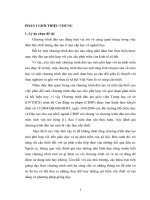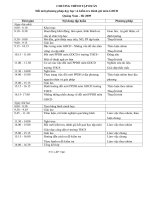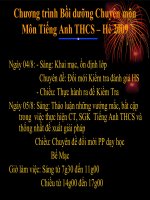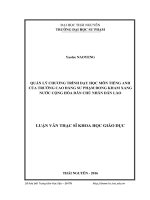chương trình tập huấn môn tiêng anh
Bạn đang xem bản rút gọn của tài liệu. Xem và tải ngay bản đầy đủ của tài liệu tại đây (508.83 KB, 31 trang )
1
E12
1. The role of the teacher
2
A MOTIVATOR
-
motivate ss
-
get ss involved in
creating activity
-
help ss generate
ideas
A RESOURCE
-
provide information
& language
-
offer advice &
suggestions
A FEEDBACK
PROVIDER
-
give feedback on ss’
writing tasks with
special care
-
respond positively &
encouragingly to the
content of ss’ written
work
2. KINDS OF WRITING IN GRADE 12
3
CONTROLLED
WRITING
-
gap-filling
-
re-ordering
sentences
-
sentence-
building
FREE WRITING
-
letter writing
-
paragraph writing
-
report writing
-
giving instructions
-
describing chart /
book / a sporting
event
4
3. Some problems with free writing
•
A. Many students find it quite difficult
because of
1. having no / lack of ideas
2. limited vocabulary to express opinions
3. disability of using structures ,style or
language in English standards
•
B. Students would probably approach the
task in different ways and produce a
wide variety of different paragraphs
4. Approaching the free-writing task
5
SELECTING THE
CONTENT
-
analyze the topic
(instruction/ key
terms / the aspect of
the topic)
-
find & select IDEAS
(brainstorming// finding
more ideas)
ORGANIZING
IDEAS
-
classify ideas
-
select relevant
ideas
-
rank ideas
SELECTING THE
LANGUAGE
-
select simple & correct English
vocabulary in terms
-
prepare some common
clauses / sentence connectors /
expressions
-
ensure to have a good grasp of
the essential grammar points
(tenses / passive / parts of
speech / structure)
FACILITATING
WRITING
TASKS
Tasks adaptation and
implementation
1- Making tasks easier:
- Breaking down tasks
- Scaffoldoing
- Lowering requirements
2- Making tasks more challenging/more
interesting
Solutions:
Teachers should help students
progress beyond very controlled
writing to freer writing by guiding their
writing ( GUIDED WRITING)
+ Giving cues.
+ Giving a short text as a model.
+ Doing oral preparation for the writing.
MODELLING
•
1. Reading a model and noticing certain
grammatical features / vocabulary / useful
expressions / text organisation / style…
•
2. Putting different parts of the text onto a
writing frame
•
3. Sequencing a jumbled text
•
4. Comparing and contrasting two forms
of text of the same genre
•
discussing
•
brainstorming
•
observing and
interpreting photos
or artwork
•
watching video
clips
•
using writing
templates/ frames
/ cloze exercises
•
mapping
•
Brain writing
•
Using matrix
Some examples of oral
preparation for the writing
Brainstorming:
–
Getting Ss’ ideas on
paper so they can
give themselves the
widest range of topics
possible
Clustering: mapping out ideas
Environment
destruction
Air pollution
………
………..
……..
Waste
disposal
……
…….
deforestation
Animal
endangered
……
……









